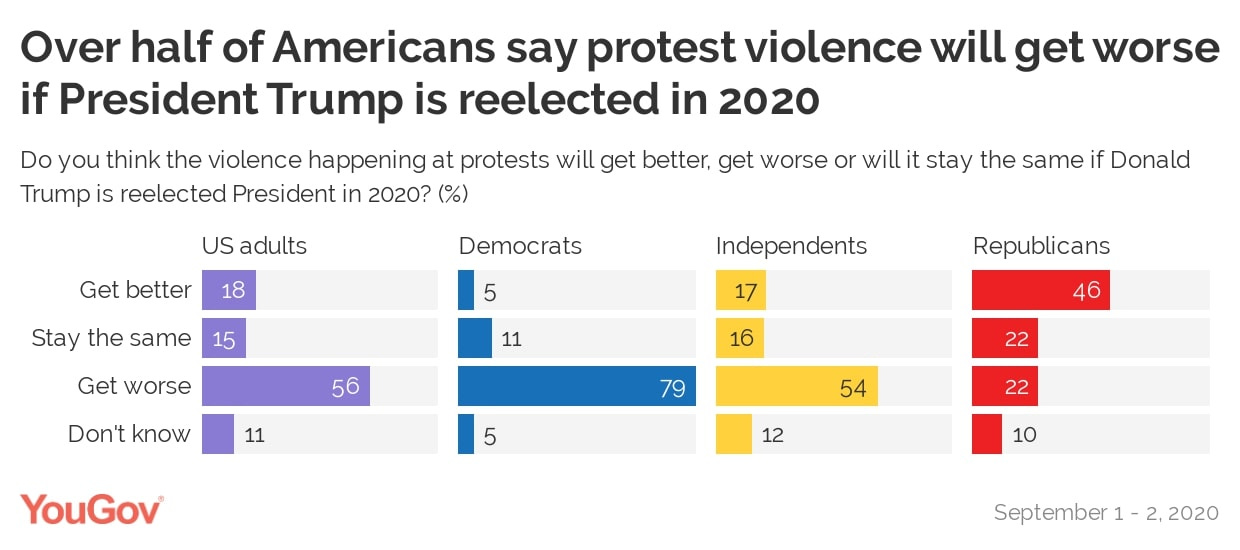The data suggest that "law and order" probably won't save Trump
And I'm unsure about what actually could
I have been troubled by the recent tearing—or, perhaps, violent cosmic severing—of our socio-political fabric. I acknowledge that it has long been pulled taut, but (and at risk of instantly outdating this post) this time does feel different.. Watching the president cheer on a caravan of conflict-seeking supporters parade into Seattle last weekend was an eye-opening moment for me. The context of the previous week made it equally troubling; at their party convention, Republicans violated federal guidlines on social distancing to cheer on their leader as he swore to use the state’s resources to deliver them an electoral victory. As he has trampled over election norms and encouraged violence, the parallels to the early 1920s and 30s have been palpable.
Reviewing the pictures of ransacked storefronts and burned-down city blocks in Kenosha, Wisconsin was also troubling; not only because of the violence, but also because many Americans have been forced into the position of feeling that violence is their only recourse.
I think political journalists and commentators have various ways of reacting to the recent unrest. One way, and the way I’ve chosen, it to be dismayed by our inability to unify in the face of danger; to recognize the forces behind that danger, regardless of what political party it may come from; and to denounce the politicization of our collective trauma. We can call out fascism where we see it and envision ways of brightening our future.
But there is also a temptation to entertain those nagging horse-race questions that are pulling on the strings in the back of our minds. And because so many people have gotten this subject so dramatically wrong—and given the address in the preceding three paragraphs—I feel compelled to correct the record.
Contrary to conventional wisdom, I do not think the recent violence and unrest in America “will be good for Trump.” The case frankly makes little sense to me. Kellyanne Conway has said that “The more chaos and anarchy and vandalism and violence reigns, the better it is for the very clear choice on who’s best on public safety and law and order.” That is not only a despicable thing to say, but it is also wrong.
For one thing, the unrest is happening while Trump is president. If it is either his or Joe Biden’s fault that police officers are killing unarmed black men in America, or that vigilantes are murdering people in the street, or that stores are being burned to the ground, it is certainly the incumbent president’s. In the 1968 metaphor on crime and votes, Trump is not Richard Nixon—he’s LBJ.
Perhaps more to the point, Polls show that voters rate Trump poorly on handling race relations, protests, and violence. Data from YouGov released last Saturday show that, 43% of voters say the country will become less safe if Trump is reelected. And these numbers have only gotten worse for the president as the news cycle surrounding Seattle and Kenosha has worn on. According to a different YouGov poll released on Wednesday, 56% think he would make protest violence, specifically, worse.

As if that weren’t clear enough, yet more of their data released on Wednesday for YouGov finds that 53% of adults, as well as a plurality of whites and middle-income Americans, feel “uneasy” about his ability to handle crime.
In an environment where 78% of Americans think that crime in their local community is at least somewhat a problem, those numbers do not suggest a winning campaign on “law and order.” Perhaps that is because Trump’s use of the term has never actually been about safety, but divisiveness.




One thing that I've noticed lately is that Civiqs polling on BLM support *appears* to be correlated the presidential polling.
Stating the obvious perhaps, but to be clear about what I'm thinking, all parties *have* to hold all their initial winnings and *try* to expand their base to win, and the Dems are not in danger in *any* of their 2016 states, especially NH, where they won by a hair, so the question is have the Dems expanded their base enough to flip any of Trump's 2016 states?
To me the only battlegrounds are PA, MI, and WI, with AZ as a godsend, and the BLM support in all of these appear to proportional to their current polling.
But NH, which has tightened relative to MI, is *still* far above the 2016 sliver victory margin but its Civiqs BLM numbers are hugely *dis*proportional (Sup-Opp:54-31(NH), 39-48(MI)),
Also there is a huge gender gap (along with age and racial gaps) on this issue that complicates things.
Long story short, does my idea of a meaningful correlation stand up to scrutiny?
Thanks
I’m not sure whether the media or the voters have an awareness of democratic norms being violated. In previous times, a President attempting and holding a political convention at the White House would simply not be tolerated. We have become so polarized and divided that we cannot agree whether a President or Presidential candidates is violating democratic norms.
I personally thought Trump was Nixon in 1968, but you are correct that Trump fits the comparison of LBJ better. For months, the voters have given Trump poor marks on race relations, protests, and violence. Perhaps the voters and the media need to reexamine our assumptions.